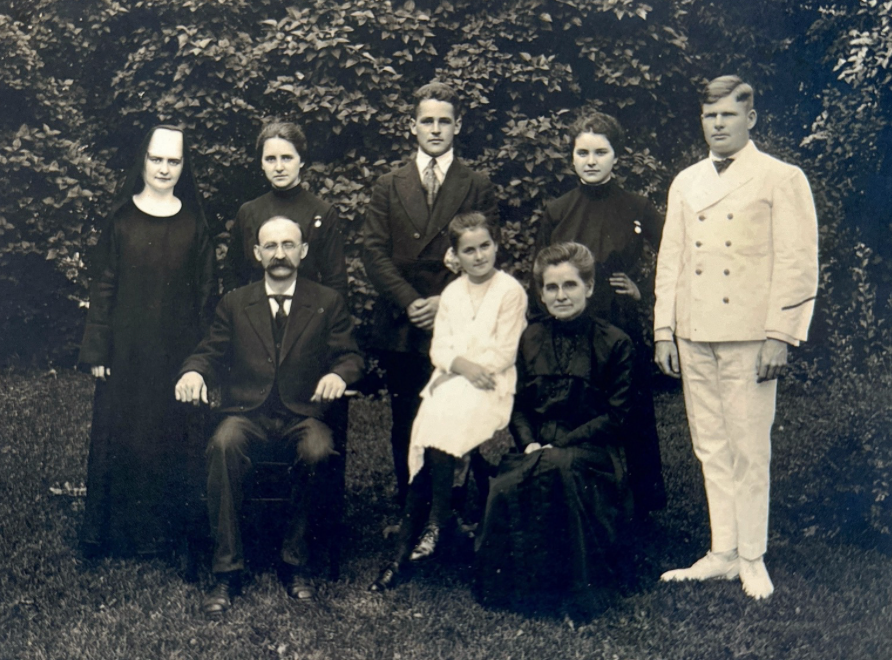By Father Bob Schreiner, S.T.L.
At the end of Chapter One in James Kritzeck’s biography of Sister Annella Zervas, O.S.B. – Ticket for Eternity – he exhorts the reader to savor the earliest events of her life and not to dismiss anything as too ordinary to shed light on what unfolds to be an extraordinary life. As an elderly Trappist monk once shared with me this same wisdom in an ancient Latin phrase: Fructis mesis in semina est. (The fruit of the harvest is in the seed.) Let me offer the following reflection upon one of these seeds which, it seems, bore great fruit.
From what we are told, it would appear that in Sister Annella’s parents we could have another Louis and Zelie Martin situation: i.e., saintly parents who raised a saintly child. Hubert Zervas, Sister Annella’s father, is described as, among many things, a devout, rigorous and studious man about his Catholic faith and life. In this regard, his reported familiarity and study of a work entitled: The Glories of Divine Grace penned by arguably one of the most important Catholic theologians of the 19th century, Matthias Joseph Scheeben, is, I suggest, one of those seeds which produced much fruit in the life of young Anna Zervas.
What is the fundamental premise of this work of Hubert’s fellow German Catholic? In short it could be summarized thus: Personal holiness/sanctity is a real thing and should be sought at all costs. This is a premise of profound significance for any age – but it is to be seen as a somewhat revolutionary notion in the mid-to-late 19th century when Hubert was reading it. After the spiritualist heresies of the 18th century which nearly destroyed Catholicism from within, the 19th century’s philosophies of the academies spawned a vicious strain of atheistic humanism and nihilism which bears its most bitter fruits in 21st century America today. Scheeben’s work sought to arm the lay Catholic with a faithful response and path to push back against the forces hostile to faith. And Hubert Zervas, it seems, took it up and shared it with his family.
Can we not imagine that the father of this family found a way to translate this exhortation into the fascination and hearts of his children? Scheeben writes: “If any men have esteemed grace according to its true worth, insofar as this is possible, without doubt it has been the Saints of the New Law. If we wish, therefore, to realize the true value of grace, we shall do best to follow the saints. In order to defend and preserve grace, the saints have spared neither their honor, their property, their limbs nor their lives. Rather, they believed, having sacrificed all these things for grace, that they had gained great profit in the loss of all earthly and natural goods, and they thought that grace was given them gratis, even though they had paid such a great price.” [Scheeben. Glories…, chapter 47]. Personal/holiness/sanctity is a real thing and should be sought at all costs.
So, when the newly professed Sister Mary Annella responded to her mother’s disappointment that there is no ‘Saint Annella’ Sister replied: “Then I shall have to be the first one,” do we not see the seed bearing great fruit? [Kritzeck. Ticket…page 30.] Or, too, when we read a sentiment which is peppered throughout her spiritual notes: “With the grace of God I am determined to become a saint.” [ ibid. page 32] Do we not glimpse the fruit of the seed? And this rock-bed belief in the necessity to be ready to sacrifice everything so as to remain in grace remained on her lips throughout the severest of her trials. Over and over and over again: “My Jesus, mercy.”
Blessed are you who steadfastly believed what you learned from your dear father, Sister Annella. You, too, can be a saint.
About the Author
Father Bob Schreiner, S.T.L., is a priest of the Diocese of Crookston. He earned his Licentiate in Sacred Theology (S.T.L.) from the University of St. Mary of the Lake in Mundelein, Illinois. He currently serves as Pastor of St. Joseph Parish in Red Lake Falls and St. Joseph Parish in Brooks, Minnesota. In addition, he is the Spiritual Director for the Guild of Sister Annella Zervas, OSB, and Chair of its Spirituality Committee. Father Schreiner was among the earliest supporters of Sister Annella’s cause for canonization and has been a devoted promoter of her story within the Diocese of Crookston.
